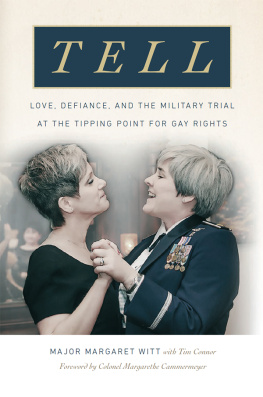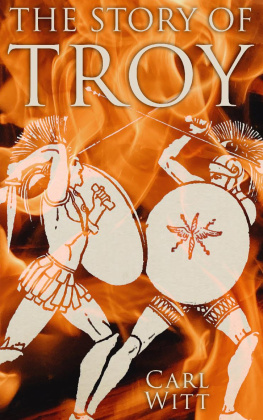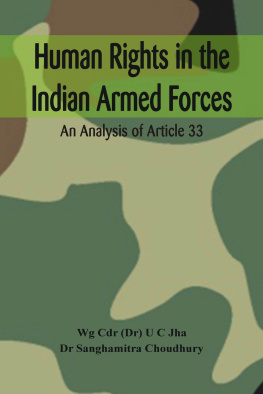TELL
LOVE, DEFIANCE, AND THE MILITARY TRIAL AT THE TIPPING POINT FOR GAY RIGHTS
MAJOR MARGARET WITT
with Tim Connor
ForeEdge
ForeEdge
An imprint of University Press of New England
www.upne.com
2017 Margaret Witt
All rights reserved
For permission to reproduce any of the material in this book, contact Permissions, University Press of New England, One Court Street, Suite 250, Lebanon NH 03766; or visit www.upne.com
Library of Congress Cataloging-in-Publication Data
Names: Witt, Margaret, 1964- author.
Title: Tell : love, defiance, and the military trial at the tipping point for gay rights / Major Margaret Witt, with Tim Connor.
Description: Lebanon NH : ForeEdge, an imprint of University Press of New England, 2017. | Includes bibliographical references and index.
Identifiers: LCCN 2017006241 (print) | LCCN 2017011336 (ebook) | ISBN 9781611688429 (cloth) | ISBN 9781512601114 (epub, mobi, & pdf)
Subjects: LCSH: Witt, Margaret, 1964Trials, litigation, etc. | United States. Department of the Air ForceTrials, litigation, etc. | Trials (Military offenses)United States. | Gay military personnelLegal status, laws, etc.United States. | Gay rightsUnited States. | Military dischargeUnited States. | Gay military personnelGovernment policyUnited States.
Classification: LCC KF229.W58 .W58 2017 (print) | LCC KF229.W58 (ebook) | DDC 343.73/014dc23
LC record available at https://lccn.loc.gov/2017006241
In memory of Sher Kung and Darren Manzella
CONTENTS
FOREWORD
Colonel Margarethe Cammermeyer | RN, PhD, USAR retired
Major Witts determination, stamina, integrity, and loyalty are brought to life in Tell, the story of her successful four-year battle to challenge the constitutional validity of her dismissal from the U.S. Air Force under the law and policy known as Dont Ask, Dont Tell. Throughout the years, thousands of others have walked in her shoes, bravely serving in the military while hiding their sexual orientation: many served full careers in silence, while many others were dishonorably discharged because of their homosexuality. However, few had the impact her case has had on changing the military to open service. In effect, Major Witt successfully challenged 240 years of policy and law that prohibited or limited homosexuals serving in the military.
A BIT OF HISTORY
To understand Major Witts story, readers need to understand that homosexuality has always been considered incompatible with military service, despite the fact that General Friedrich von Steuben, a known homosexual, is the creator of American military organization, discipline, training, and supply organization. In fact, von Steuben organized the Continental army effectively enough to win the Revolutionary War. Ironically, at the same time, Lieutenant Frederick Gotthold Enslin, who was with Washington at Valley Forge, was drummed out of the military, disgraced and humiliated for homosexual conduct in 1778.
Since those revolutionary times, contradictory attitudes and treatment have continued to plague gays in the military; regulations and laws have evolved over the years based on social trends dealing with homosexuality. For instance, during World War I, homosexual conduct would result in a court-martial; also, at that time witch hunts were conducted to ferret out homosexuals from the military. Sodomy was a crime punishable by incarceration. Physical characteristics, stigmata of degeneration, were used to determine sexuality and to prevent individuals from joining the military because they were deemed unfit for service. For instance, in 1921, the disqualification standard included men with female physical characteristics such as sloping shoulders, broad hips, an absence of facial and body hair, etc.
By World War II, homosexual proclivity was the disqualifier for the draft. Military psychiatrists determined that homosexuals had psychopathic personality disorder and were unfit to fight. Those already serving would be discharged and denied veterans benefits regardless of their accomplishments or skills.
During the Korean War, homosexuals were classified into three categories based on behavior, ranging from criminal behavior to denial of homosexual behavior, which determined their type of discharge. In addition, sodomy became defined under the Uniform Code of Military Justice, Article 125, and would result in imprisonment. During the 1950s, homosexuals were regarded as security risks, impeding national security, and President Eisenhower signed Executive Order 10450 prohibiting homosexuals from being employed by the federal government.
Homophobic attitudes survived the more liberal years of civil rights for minorities and women; by 1972, regulations continued to establish policies for discharging enlisted personnel found to be unfit or unsuitable for duty because of homosexuality only, even if their service was commendable. However, contradictions continued, as there was discretion by commanders, so some known homosexuals were able to continue their careers. Consequently, treatment of individual cases was uneven, which resulted in lawsuits after service members were discharged. By 1981, the Department of Defense flatly stated that homosexuality is incompatible with military service; therefore, mandatory discharge applied to all known homosexuals. This directive was reaffirmed in 1982, 1993, and 2008.
However, by 1993, after many advocates, civilians, and President Clinton had put forth considerable effort to attain open service, there was a compromise that created the law Dont Ask, Dont Tell (DADT). In effect, homosexuality was still considered unacceptable to morale, good order, discipline, and unit cohesion, but the law recognized that homosexuals were actively serving and therefore allowed them to continue doing so as long as this was a silent characteristic (no disclosure). During its tenure, DADT resulted in the discharge of over fourteen thousand service members.
By 2010, President Obama decided it was time for the demise of Dont Ask, Dont Tell. Fighting extreme odds and the long history of anti-homosexual agendas, many supporters lobbied against the biased policy; finally, with involvement of the courts and senior military leadership, Congress acted, voting to repeal DADT, and on December 22, 2010, President Obama signed the repeal.
Although another eight months passed before the enactment of the repeal, on September 10, 2011, all legal bias against homosexuals disappeared from the books; the United States, for the first time ever, provided open service for homosexuals.
As the final coup de grce, On June 28, 2013, the United States Supreme Court struck down the Defense of Marriage Act. Finally, homosexuals, including military personnel, were recognized as having equal rights to marry; same-sex marriage has become legal throughout the United States.
In addition, progressive ideals finally were expanded to others: after another four years, on June 30, 2016, transgender service members were also granted the right to serve without constraint.
SIGNIFICANCE OF MAJOR WITTS STORY
While reading Tell, Margaret Witts story, think of it as multilevel love story. Witt not only loves and wants to serve her country; she also does so with distinction and dedication, despite discrimination under that countrys laws. This is also the love story of a nurse who not only cares for fellow service members, but also does so with compassion, dedication, and skill. Finally,








